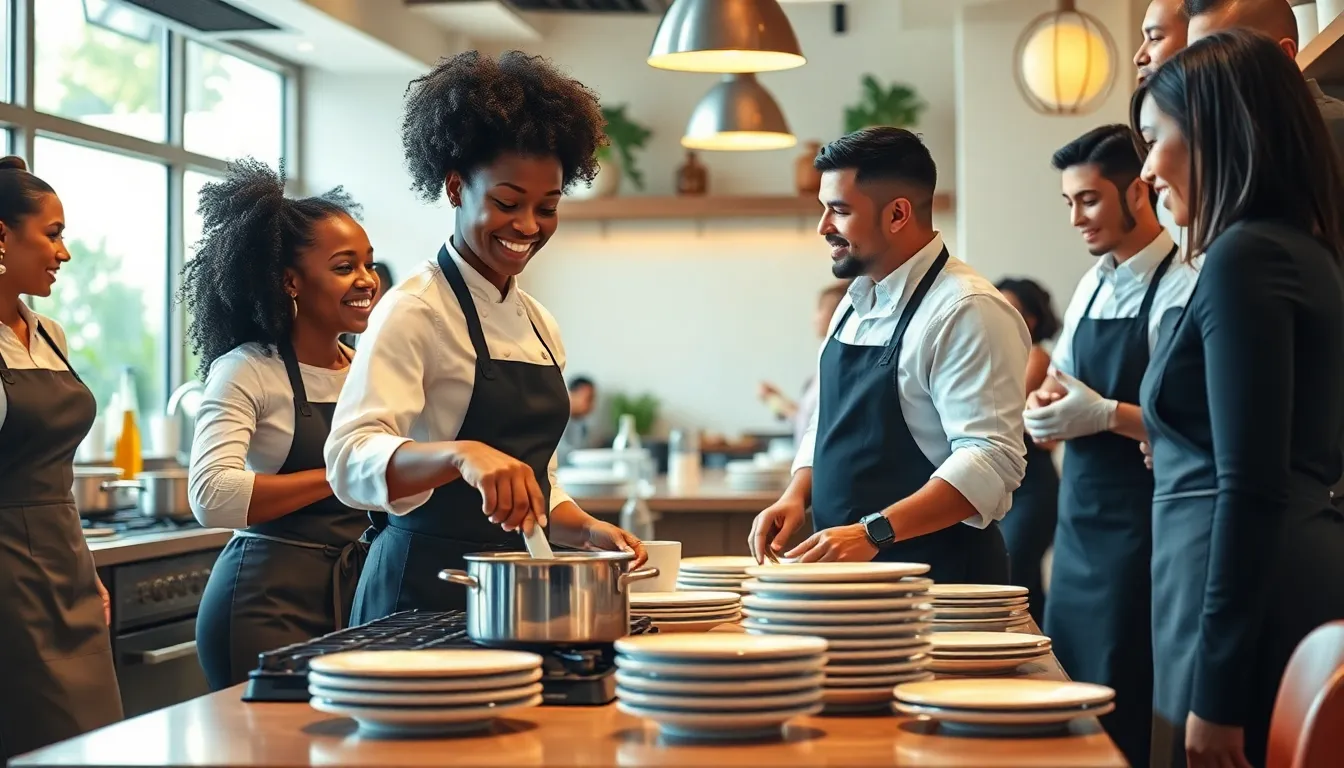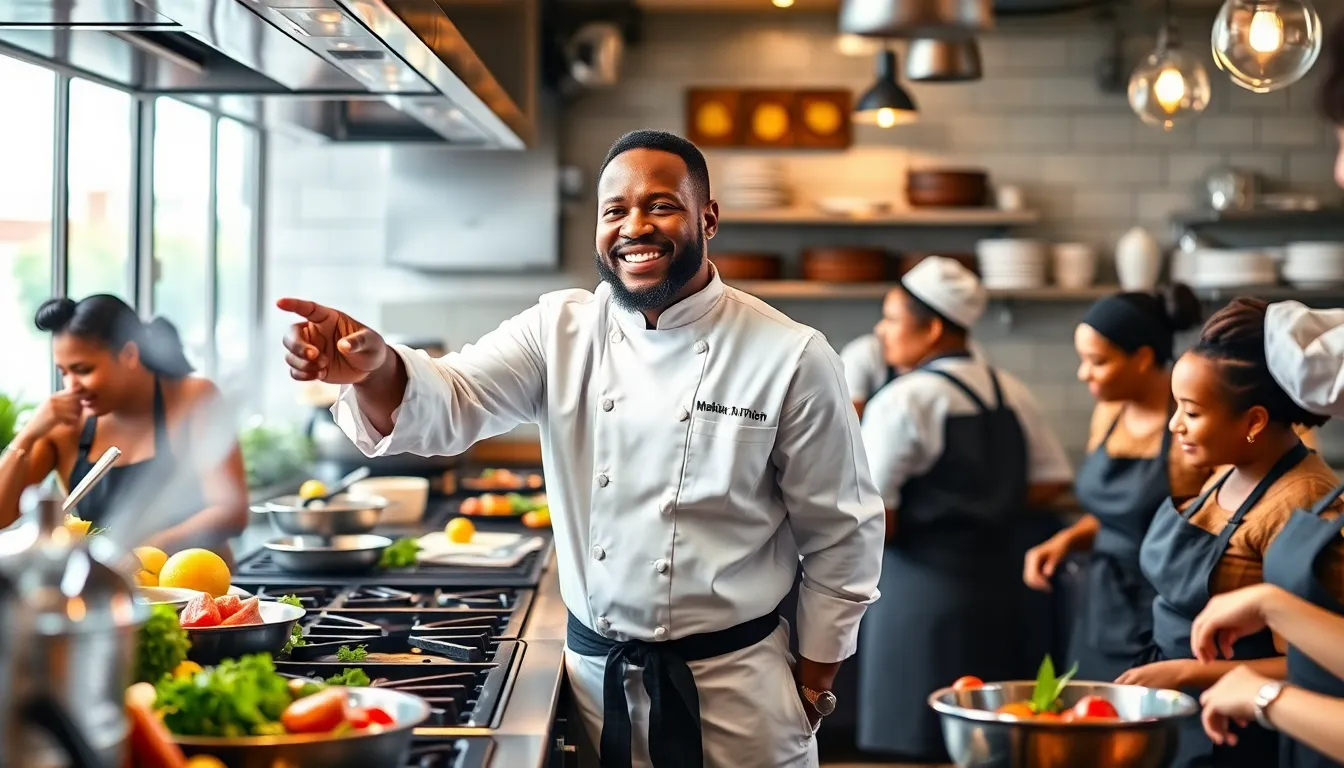In the bustling world of restaurants, leadership isn’t just about calling the shots; it’s about serving up a side of inspiration with every dish. Imagine a head chef who’s not just a culinary wizard but also a master motivator, turning stress-filled shifts into a symphony of teamwork. Restaurant leadership lessons reveal that great leaders can whip up not just meals but also a thriving culture where everyone feels valued.
Table of Contents
ToggleUnderstanding Restaurant Leadership
Restaurant leadership requires a unique blend of skills that goes beyond basic management. Effective leaders build strong teams while ensuring operations run smoothly.
Key Characteristics of Effective Leaders
Effective leaders exhibit strong communication skills. They convey expectations clearly to staff members, fostering an understanding of roles and responsibilities. Empathy plays a crucial role, enabling leaders to understand staff needs. Adaptability remains vital, allowing leaders to pivot strategies when challenges arise. Strong decision-making skills also define effective leaders, as they evaluate options swiftly to ensure a responsive environment. Respect for staff promotes a culture of appreciation, leading to increased morale and loyalty.
The Importance of Vision and Mission
A clear vision drives restaurant success. Leaders articulate a mission that guides team efforts and shapes daily operations. Aligning all employees with the restaurant’s values enhances teamwork and cohesion. Such alignment motivates staff, as they grasp their role in the bigger picture. Regularly revisiting the mission fosters engagement among employees, strengthening their commitment. Establishing specific goals linked to the vision encourages continuous improvement, providing a roadmap for future growth.
Building Strong Teams

Strong teams form the backbone of successful restaurants. Effective leadership fosters collaboration and commitment among staff members.
Hiring the Right People
Hiring the right people begins with a clear understanding of the restaurant’s culture and values. Prioritizing candidates who align with these principles increases the likelihood of a cohesive team. Evaluating interpersonal skills during the interview process can provide insights into a candidate’s fit. Restaurant leaders benefit from looking beyond experience to assess attitude and enthusiasm. Including existing team members in interviews can also offer valuable perspectives. Successful hires contribute not only culinary skills but also a team-oriented mindset, enhancing overall dynamics.
Fostering a Positive Work Environment
Fostering a positive work environment cultivates employee satisfaction and retention. Leaders create this atmosphere by encouraging open communication and recognizing achievements. Prioritizing employee feedback helps leaders identify areas for improvement. Implementing regular team-building activities strengthens relationships and collaboration. Designating spaces for relaxation allows staff to recharge during busy shifts. Supporting a work-life balance keeps morale high and reduces burnout. When employees feel valued, their motivation and productivity levels increase substantially.
Communication Strategies
Effective communication strategies serve as the foundation for successful restaurant leadership. Clear and open communication fosters trust and transparency among team members.
Open Lines of Communication
Establishing open lines of communication encourages dialogue between staff and leaders. Leaders can create a culture where employees feel comfortable sharing ideas and concerns. Regular team meetings and informal check-ins promote a transparent atmosphere. Utilizing various communication tools enhances accessibility and ensures messages reach everyone. For instance, implementing messaging apps can provide immediate updates on changes or specials. Scheduling one-on-one sessions allows personal connections, helping staff express opinions without hesitation. Open communication not only increases engagement but also boosts overall morale within the team.
Encouraging Feedback and Collaboration
Encouraging feedback cultivates a collaborative environment essential for restaurant operations. Gathering insights from employees empowers them to contribute ideas that can enhance processes. Leaders should actively ask for feedback on menu items, service practices, and work conditions. Introducing methods such as anonymous suggestion boxes can facilitate honest responses. Collaborative brainstorming sessions lead to innovative solutions while strengthening team cohesion. Recognizing contributions during meetings inspires continued participation. Encouraging a culture that values feedback enhances problem-solving and drives continuous improvement in the restaurant.
Managing Challenges and Conflicts
Restaurant leaders frequently encounter challenges and conflicts that necessitate effective management. They must address issues promptly to maintain a positive atmosphere.
Resolving Issues Gracefully
Leaders foster a culture of openness where team members feel comfortable expressing concerns. Recognizing the importance of timely resolution, addressing conflicts as they arise prevents escalation. Utilizing active listening techniques helps leaders understand differing perspectives and clarify misunderstandings. Encouraging a collaborative environment allows employees to participate in finding solutions, reinforcing team cohesion. Mediating discussions with empathy ensures that all parties feel heard and valued, ultimately promoting a harmonious work environment.
Navigating High-Stress Situations
High-pressure moments in restaurants are inevitable, demanding strong leadership. Resilience is crucial; leaders must remain calm and focused when things go awry. Prioritizing tasks allows them to delegate responsibilities effectively. Establishing clear protocols can guide the team during peak hours or unexpected challenges. Offering support and encouragement boosts morale, motivating employees to perform their best under stress. By fostering a team-oriented approach, leaders create a supportive environment where staff can thrive, even during the busiest shifts.
Continuous Growth and Development
Continuous growth and development stand as pillars of effective restaurant leadership. Leaders prioritize the cultivation of their teams and themselves to foster an environment ripe for success.
Investing in Training and Education
Investing in training and education enhances team skills. Regular workshops and culinary classes contribute to professional growth. Each staff member should feel supported in their learning journey, whether in front-of-house or back-of-house roles. Access to resources like online courses and mentorship programs empowers employees to improve capabilities. Enhancing skills translates to better service and increased guest satisfaction.
Embracing Change and Innovation
Embracing change and innovation drives restaurant progress. Leaders must remain open to new ideas, technology, and market trends. Regularly assessing operational processes leads to identifying areas for improvement. Encouraging staff to suggest innovations fosters a culture of creativity. Implementation of effective systems, such as digital ordering or inventory management tools, streamlines operations. Adapting to change not only keeps restaurants relevant but also engages employees in their work.
Effective restaurant leadership is a multifaceted journey that requires a blend of skills and a commitment to fostering a positive work environment. By prioritizing communication empathy and adaptability leaders can create cohesive teams that thrive even in high-pressure situations.
Investing in team development and encouraging innovation not only enhances individual skills but also drives overall restaurant success. When leaders align their vision with the values of their staff they cultivate a culture of collaboration and commitment that ultimately leads to exceptional service and guest satisfaction.
In the dynamic world of hospitality strong leadership remains the cornerstone for building resilient teams and achieving lasting success.




